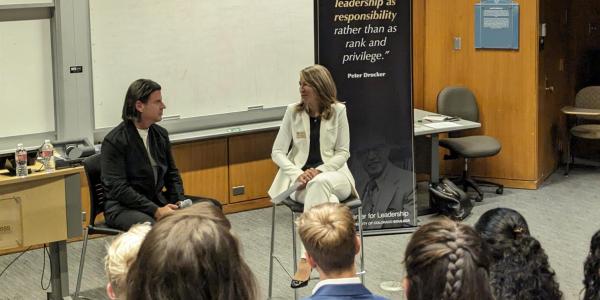The University of Colorado at Boulder Environmental Center, with support from a number of campus departments and private sources, is expanding "Computers To Youth," its innovative approach to both protect the environment and benefit disadvantaged communities in Colorado. It is now an ongoing, year-round program with its formal launch set for Saturday, May 15, on the CU-Boulder campus.
Computers To Youth provides middle and high school students from low-income communities around Colorado with upgraded computers and basic computing programs. Surplus computers are donated by CU's Property Services department, whose staff will test components and securely remove data. The high school students then bundle these components into an upgraded computer and load the latest software to assist with academic achievement when they take the computer home at the end of the event.
On-site instruction and follow-up mentoring is provided by CU students from the state-wide MESA program (Mathematics Engineering Science Achievement). CU-Boulder's MESA Center is administratively located within the Department of Pre-College Outreach Services in the Office of Diversity, Equity and Community Engagement (ODECE).
"Since an important goal is to enhance high school students' academic skills to enable their enrollment at universities like CU, these CU student mentors also provide ongoing assistance and encouragement throughout the year," said Gale Day, MESA Center director for CU. "For those high school students who choose to enroll at CU-Boulder, ODECE further supports the academic and personal success through academic retention programs like the CU LEAD Alliance."
Ten MESA high school students are recommended for the program by MESA advisers (teachers) in school districts throughout Colorado. A total of 40 students from four school districts are participating this year. The 10 students from each district then visit the CU-Boulder campus on one of four Saturdays. On May 15, students from the Denver Public Schools will come to campus to work with five CU engineering students.
"The university students felt that it was an inspiring learning experience. The fact that CU put together this program that saves resources, prevents waste and enables future scientists and engineers is completely brilliant, " said engineering student Rebecca Miller.
Computers to Youth addresses two pressing issues: the growing amount of waste from computers and the "digital divide" -- the relative inaccessibility to computing and communication technology.
As technology increasingly becomes a part of daily life, those without computer access fall further and further behind. This consequence, known as the "digital divide," mainly affects under-privileged populations, especially youth. With such a great amount of computer equipment being discarded by a technologically advanced campus and community, it only makes sense that some of this equipment be restored and redistributed in an effort to bridge the digital divide.
The Environmental Center has demonstrated success in this area, receiving funding from Dell for CU's first computer roundup in 2005 when over 50 working systems were collected from the community over the three-day event. In 2006, EPA funding allowed CU to expand its efforts statewide. With this experience, CU can more fully facilitate connecting CU students with disadvantaged middle and high school students year-round.
"This project is unique and exciting because it connects CU's commitment to diversity with our experience protecting the environment," said Jack DeBell from CU's Environmental Center. "It is designed to remind us that these two efforts can complement one another." The CU Environmental Center's newly expanded mission strengthens this link between environmental preservation and social equity.
In addition to CU's Property Services, Office of Diversity, Equity and Community Engagement (ODECE), and Environmental Center, other important contributors to date include the CU Parents Association and the Microsoft Corporation. "Hopefully, this project will create additional collaboration with community groups and corporate sponsors in Colorado," said Karen Hunter, MESA Coordinator with the St. Vrain School District, whose high school students were participants in a warm-up event at CU last month. "The students' new-found confidence as a result of the amazing folks at CU tell it all."
For more information, contact Jack DeBell at 303-492-8733 or debell@colorado.edu.



